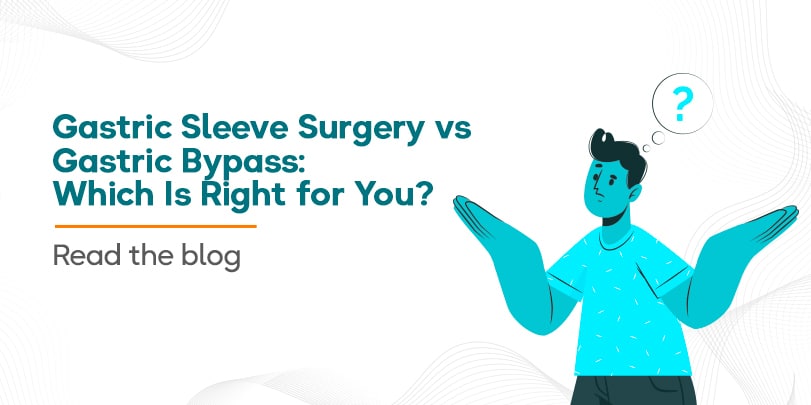If you’re struggling with obesity and considering weight loss surgery, you’ve likely come across two popular options: gastric sleeve surgery and gastric bypass. Both procedures can be life-changing, but choosing the right one for you depends on your individual needs and circumstances. This blog post will delve into the key differences between these surgeries to help you make an informed decision.
1. Procedure Overview:
Gastric Sleeve Surgery:
- Minimally invasive laparoscopic procedure. (involving 3, Or 4 small key hole incisions , single port sleeve can be done in some of the selective cases)
- Removes approximately 55% – 65% of the stomach, leaving a long, banana-shaped sleeve.
- Restricts food intake and reduces hunger hormones.
- Shorter surgery time and faster recovery compared to gastric bypass.
Gastric Bypass:
- More complex laparoscopic procedure involving 4 to 5 small key hole incisions.
- Creates a small stomach pouch and reroutes part of the small intestine.
- Bypasses a portion of the digestive system, leading to faster weight loss and improved blood sugar control.
2. Weight Loss and Long-Term Effects:
- Gastric Sleeve: Patients typically lose 60-70% of their excess weight within 1-1.5 years. However, weight loss tends to plateau after this period, requiring strict dietary and lifestyle changes for long-term success.
- Gastric Bypass: Offers more rapid and sustained weight loss, with patients losing 70-80% of their excess weight within 1-1.5 years. It can also lead to significant improvements in obesity-related conditions like type 2 diabetes , sleep apnea, Hypertension, PCOD, Fatty liver disease
3. Risks and Complications:
- Both procedures: Common risks include bleeding, leaks, and nutritional deficiencies. Long-term complications like dumping syndrome and internal hernias are also possible. With help of an experience and expert surgeon team, nutritionist, and good hospital set up all the risks can be avoided.
- Gastric Sleeve: Specific risks include staple line leaks and stomach pouch enlargement.
- Gastric Bypass: Higher risk of intestinal problems, vitamin and mineral deficiencies, and malnutrition
With help of an experience and expert surgeon team like at ANSH OBECURE, nutritionist, and good hospital set up all the risks can be avoided.
4. Who is a Good Candidate?
Gastric Sleeve:
- BMI of 35-40 with one or more weight-related co-morbidities.
- Good overall health and ability to commit to lifestyle changes.
- Not previously undergone major abdominal surgery.
- Young male/ females (teen age / unmarried).
- Old age group male / female without any comorbidities
Gastric Bypass:
- BMI of 40 or higher, or 35-39 with severe weight-related health conditions.
- Unable to achieve or maintain weight loss through non-surgical methods.
- Can tolerate a more complex surgery and prolonged recovery.
5. Choosing the Right Procedure:
The decision between gastric sleeve and gastric bypass is highly personal and should be made in consultation with a qualified bariatric surgeon. Factors to consider include:
- Your BMI and weight loss goals.
- Your overall health and medical history.
- Your lifestyle and commitment to post-surgical changes.
- The potential risks and benefits of each procedure.
- Follow up after surgery needs to take in to consideration.
A Word from Ansh Obecure:
We understand that weight loss surgery is a big decision. At Ansh Obecure, our team of experienced bariatric surgeons is dedicated to providing personalized care and guidance throughout your journey. We offer both gastric sleeve and gastric bypass procedures, along with comprehensive pre-operative and post-operative support.
If you’re considering weight loss surgery, we encourage you to schedule a consultation with us. We’ll discuss your individual needs and help you determine the best path forward to achieve your health and weight loss goals.
Remember, the choice between gastric sleeve and gastric bypass is not a one-size-fits-all solution. By understanding the differences and working with an Experienced and qualified bariatric surgeon, you can make an informed decision that leads to lasting success.

